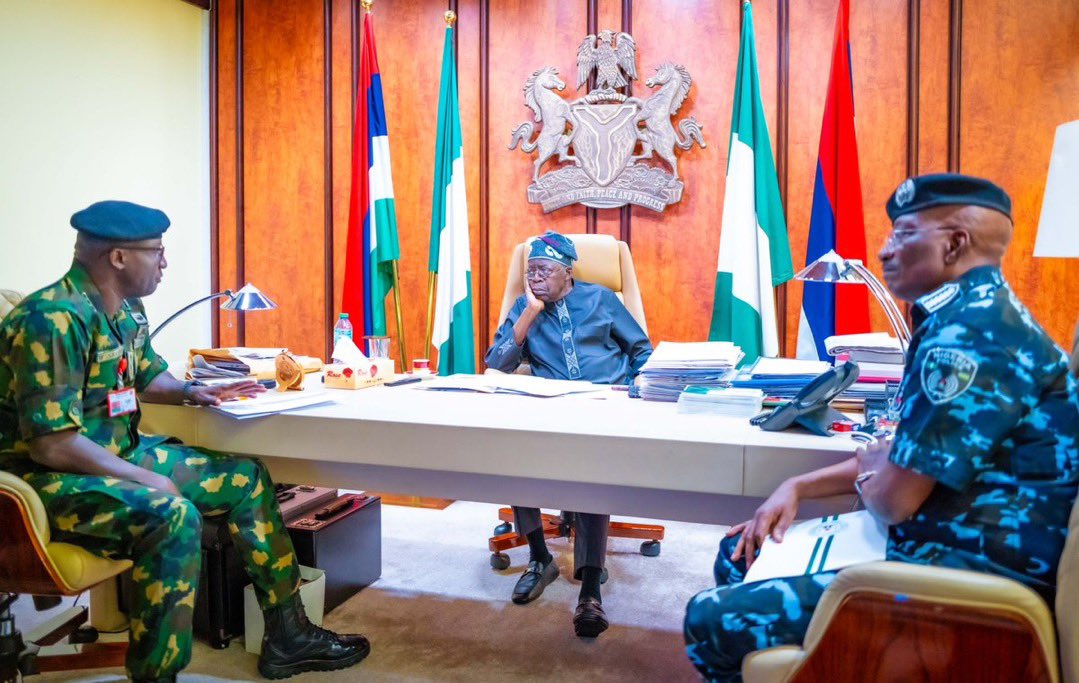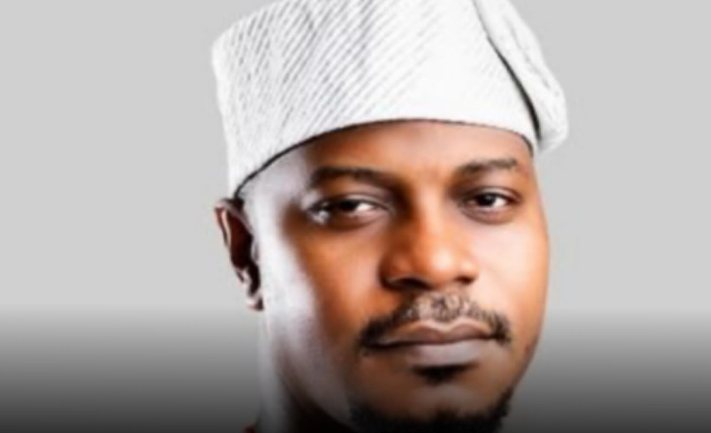

President Bola Ahmed Tinubu on Sunday entered a high-stakes closed-door meeting with Nigeria’s top security and military chiefs at the Presidential Villa, a development that has intensified nationwide speculation amid the recent surge in abductions across northern states. The meeting, which began quietly behind sealed doors, drew the presence of the country’s most powerful security figures, signaling what appears to be one of the administration’s most urgent deliberations since the latest wave of insecurity escalated.
Sources within the State House confirmed that the President summoned the heads of all major security agencies, including Chief of Defence Staff General Olufemi Oluyode, Chief of Army Staff Major General Waidi Shaibu, Chief of Air Staff Air Vice Marshal Kelvin Aneke, Chief of Naval Staff Rear Admiral Idi Abbas, and Chief of Defence Intelligence Major General EAP Undiendeye. Also in attendance are Inspector General of Police Kayode Egbetokun and Director-General of the Department of State Services, Tosin Ajayi—forming a full-circle security architecture around the President as the country battles what many Nigerians describe as a relentless assault on safety and stability.
The urgency surrounding the meeting comes at a time when reports of mass abductions, coordinated attacks on rural communities, and rising threats along major highways have rekindled concerns about the country’s ability to curb violent crime. Several communities across the North have seen a spike in kidnappings, with bandits and armed groups targeting schoolchildren, travelers, and villagers in what security analysts say reflects increasing boldness among criminal networks. The situation has put pressure on the government, which has repeatedly promised to restore safety and peace to affected regions.
The decision to convene this top-level meeting follows a string of incidents that have unsettled both federal authorities and citizens. While State House officials declined to provide details, sources suggested that the discussions were not only reactive but part of broader measures being shaped to disrupt the activities of criminal elements operating across multiple states. The President, who has maintained that national security remains the cornerstone of his administration, had earlier issued directives aimed at strengthening inter-agency collaboration—a theme that insiders believe dominated today’s meeting.
According to those familiar with the atmosphere inside the Villa, the tone of the gathering was intense, focused, and marked by the recognition that the country stands at an inflection point in its security trajectory. Top officers reportedly arrived in a convoy of official vehicles, their presence underscoring the seriousness with which the government is treating the current situation. Officials from the Department of State Services were also spotted entering the premises earlier in the day, fueling further curiosity about the agenda.
Across social media, Nigerians have been reacting to the news with a mixture of hope and frustration. Many citizens believe this meeting could mark a turning point if concrete decisions are made and swiftly implemented. Others, however, expressed skepticism, saying previous meetings of similar scale have ended with little visible impact on the ground. For families in affected communities, the recurring reports of abductions have become a traumatic cycle. Parents in vulnerable regions have described sleepless nights and an ever-present fear of attacks, as criminal groups continue to operate with alarming confidence.
Security watchers say that the presence of all service chiefs together—rather than individual briefings—suggests a coordinated, multi-pronged approach may be underway. The Chief of Defence Staff, who oversees joint operations across the armed forces, is expected to present updated intelligence on insurgent and bandit movements. The Inspector General of Police may brief the President on the deployment of tactical units and recent challenges faced by police officers who often encounter heavily armed gangs in rural areas. Meanwhile, the DSS boss is likely providing sensitive information on the evolving networks of financiers, informants, and cross-border collaborators who enable these criminal operations.
Beyond the immediate concerns, analysts believe the meeting could result in sweeping decisions touching on surveillance technology, special military deployments, community policing, and possibly a restructuring of certain commands in the most affected zones. With the dry season approaching—a period historically associated with increased criminal activity due to easier movement through forests and open terrain—security agencies are reportedly under pressure to adopt proactive measures rather than wait for attacks.
In many northern communities, recent kidnappings have not only overwhelmed families but destabilized local economies. Farmers in several states have abandoned their farmlands due to fear of attacks, further complicating food security challenges already facing the country. Schools have been forced to close or reduce attendance, leaving thousands of children out of classrooms. Transporters are also avoiding certain routes, creating bottlenecks in the movement of goods. These ripple effects have raised concerns that insecurity, if not addressed urgently, could undermine economic recovery efforts.
President Tinubu, since taking office, has repeatedly pledged to overhaul the nation’s security framework, emphasizing modernization, joint operations, and strategic intelligence gathering. However, critics argue that despite these promises, violent groups continue to grow in audacity. They point to recent incidents where attackers launched raids lasting hours without interception, and cases where kidnapped victims spent days in captivity before any rescue attempt materialized. The growing impatience among Nigerians has therefore cast significant attention on whether today’s meeting produces tangible outcomes.
Though the details remain concealed behind the guarded doors of Aso Rock, a senior government source hinted that the President may issue new operational directives within the coming days. These may include redeployment of troops to hotspots, reinforcement of police tactical units, or a restructuring in command hierarchy to improve response time. There is also widespread belief that the government may announce targeted operations involving combined forces from the Army, Air Force, and DSS, particularly in forest corridors that have become sanctuaries for criminal groups.
As the nation awaits official communication, the significance of the meeting cannot be overstated. The assemblage of every major security chief at the same time underlines both the depth of the crisis and the weight of responsibility the government now carries. For communities living under the shadow of fear, the hope is that this is not just another symbolic gathering, but a decisive moment that will lead to meaningful action on the ground.
Whether the outcome of this meeting ushers in a new wave of aggressive security operations or merely joins the list of high-profile discussions remains to be seen. But as the threats multiply and Nigerians yearn for peace, all eyes remain fixed on the Presidential Villa, waiting for the next step from a government that knows the nation’s stability hangs in the balance.


